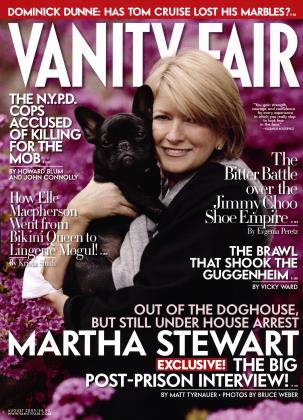Sign In to Your Account
Subscribers have complete access to the archive.
Sign In Not a Subscriber?Join NowDeclining to become a nude "calendar boy" for his small town, the author focuses instead on some less explicable behavior: the Cruise and Crowe meltdowns, the pre-trial woes of Phil Spector (four women who say he waved a gun at them), and Michael Jackson's acquittal
August 2005 Dominick Dunne Larry FinkDeclining to become a nude "calendar boy" for his small town, the author focuses instead on some less explicable behavior: the Cruise and Crowe meltdowns, the pre-trial woes of Phil Spector (four women who say he waved a gun at them), and Michael Jackson's acquittal
August 2005 Dominick Dunne Larry Fink View Full Issue
View Full Issue






Subscribers have complete access to the archive.
Sign In Not a Subscriber?Join Now